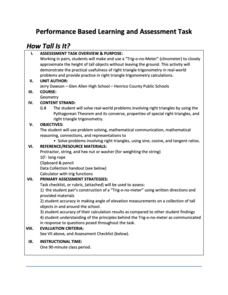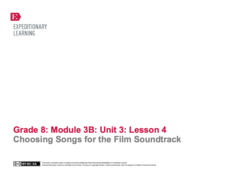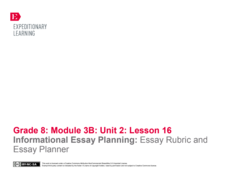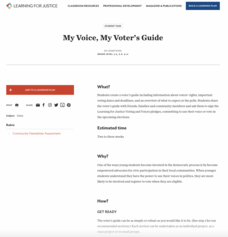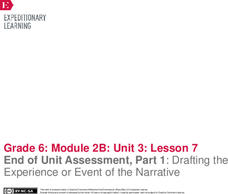EngageNY
Analyzing Character: Understanding Atticus (Chapter 1, cont.)
Scholars use a Note-catcher to gather text evidence to reveal the character of Atticus Finch in To Kill a Mockingbird. After collecting evidence, they work with a partner to make an inference about the character and then share their...
EngageNY
Analyzing How Literature Draws on Themes from the Bible and World Religions: The Golden rule (Chapter 3)
Scholars use their Golden Rule Note-catcher to examine passages from To Kill a Mockingbird. They then take a gallery walk to compare and contrast the quotes before sharing Think-Write-Pair-Share ideas on how the quotes demonstrate the...
CK-12 Foundation
Fractions as Percents: Baking Cookies
A five-question interactive challenges mathematicians to solve word problems involving fractions as percents. Baking two different types of cookies and needing the exact amount requires scholars to make fractions, turn them into...
Radford University
Distance and Midpoint Formulas in a Mall
Go for a walk in the mall. Pupils find distances between stores on a diagram of a mall on Quadrant I. The scholars also determine the midpoint between a store and an entrance to the mall to then create their own paths and determine their...
Radford University
How Tall Is It?
Find the height from afar. Teams role play as summer interns to find the height of a set of windows from the outside. Scholars must first determine how to find the height with the available tools. After determining a strategy involving...
CK-12 Foundation
Add and Subtract Decimals with Front-End Estimation: Wooden Beams
A six-question interactive tasks mathematicians to solve addition and subtraction problems using front-end estimation. Question types consist of multiple-choice and true or false. A set of wooden beams that can be measured using moveable...
EngageNY
Choosing Songs for the Film Soundtrack
Music has the power to bring topics alive. Learners take on the role of sound director in their film planning and choose the songs to accompany their photographs. They must also support their decisions with evidence and reasoning as they...
EngageNY
Final Performance Task: Presentation of Photograph and Song Selections
The presentation is the thing. Learners combine all their skills by creating a pitch for their films about the Little Rock Nine. They explain to classmates why they selected the images and songs using self-created prompt cards. The end...
EngageNY
Informational Essay Planning: Essay Rubric and Essay Planner
Class members dig into the expectations for the end-of-unit assessment for A Mighty Long Way by studying the rubric. The Rubric Criteria strips help pairs of readers look more closely at specific rubric points. They share ideas with the...
Thoughtful Learning
Checking the Emotion Thermometer
A hand-drawn thermometer provides a strong visual for how much of an emotion a child is feeling. Scholars color the thermometer's mercury to showcase whether what they are feeling is high or low at a certain moment. Questions allow...
EngageNY
Defining Key Terms: Gender and Internal Identity
Be a team player! Learners examine the article Team Players and discuss how the title might relate to identity. They then analyze the article using the sheets Reader’s Notes: Team Players and Text-Dependent Questions: Team Players....
Teaching Tolerance
Identity Artifacts Museum
Who are you? It's a simple question, but younger learners have the opportunity to express their complex identities by making artifacts that represent parts of their identities. After engaging in the activity, they share who they are with...
Teaching Tolerance
My Voice, My Voter's Guide
Class members may be too young to vote, but that doesn't mean their voices are silent! After researching key information, such as policies for registering to what to expect at the polls, young scholars create and present election guides...
K20 LEARN
Government and Your Right To Vote: Voting Rights In America
Gaining voting rights was difficult over the course of decades, but the debate over who should actually be allowed to cast a ballot remains. Scholars explore the history of the struggle, including the fifteenth and nineteenth amendments,...
EngageNY
Close Reading: Excerpt 2 of “The Digital Revolution and the Adolescent Brain Evolution”
Help scholars comprehend a challenging text. Using the resource, pupils read excerpts from an article about the digital revolution and adolescent brain development. As they read, they answer text-dependent questions and complete a close...
Missouri Department of Elementary
How Much Does Smoking Really Cost?
Following a brief survey about tobacco, scholars examine a fact sheet to answer questions about the substance. A practice page challenges the class to determine the cost of the habit using money math. Pupils discuss their findings...
American Museum of Natural History
Field Trip Mars
Fly around the Martian surface. Pupils view a presentation on the planet Mars featuring a flyover that shows different views of the surface where rovers have landed and explored on different missions. As individuals watch the images, the...
EngageNY
Using Multimedia in Presentations: Preparing to Present Claims
Eye contact, volume, pronunciation are all parts of a great presentation. Scholars create visual displays to clarify the claim for an upcoming presentation about whether the American Academy of Pediatrics should increase its screen time...
University of Oklahoma
Understanding My Individualized Education Program
The final unit the series helps learners become familiar with the major components and vocabulary in their IEPs. Using a KWL chart, class members record information about their IEPs and set goals for themselves.
EngageNY
Using Multimedia in Presentations: Presenting Claims
Visuals help clarify claims. Scholars create visual displays to accompany their end-of-unit presentations about water sustainability. Using blank paper and their notes from the unit, they put their creativity to good use and then...
Learning to Give
Deliver Gratitude Day
Gratitude is the focus of a discussion that sets the stage for pupils to take part in a service-learning project in which they deliver notes of kindness by way of social media or mail. A reflection closes the learning experience.
EngageNY
End of Unit Assessment, Part 1: Drafting the Experience or Event of the Narrative
Don't be tone deaf. Scholars study two photographs to better understand the concept of tone, so they can incorporate the literary device into their writing. Additionally, they draft the experience or event portion of their personal...
National Endowment for the Humanities
The Freedom Riders and the Popular Music of the Civil Rights Movement
The Civil Rights Movement of the 1960s marched to its own beat—literally. Using songs from the era, as well as other primary sources such as King's "I Have a Dream" speech, class members analyze lyrics to discover how music and protest...
Bonneville
Unique Solar Cell Model Sketch and Presentation
There's always room for improvement. Continuing from the previous instructional activity, learners first create a two- or three-dimensional model of their solar cell designs. They then give short presentations to the rest of the class...
Other popular searches
- Hiv Aids
- Graphic Aids
- Hiv/aids
- Hiv Aids Research Papers
- Hiv Aids Hands On
- Hiv Aids Lab Phenolphthalein
- Aids Epidemic
- Hiv Aids Lesson Plans
- Aids Public Health
- Hiv Aids Lab
- Aids and African Americans
- Hiv Aids Fun






